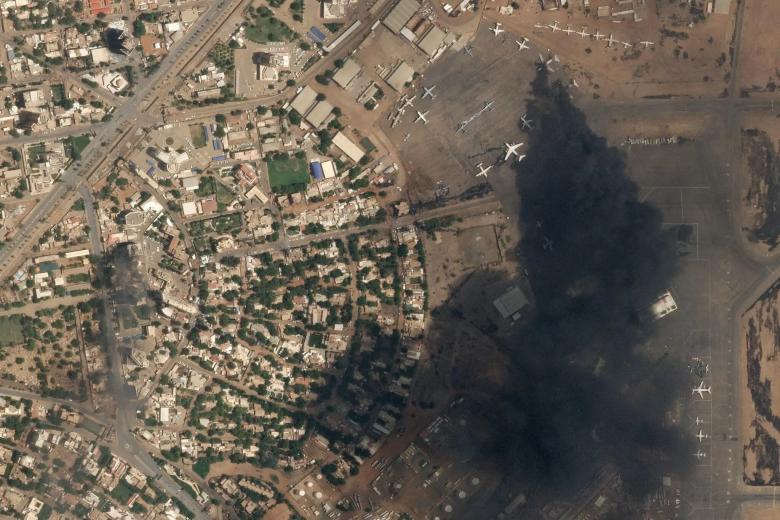Is Sudan a victim of the international struggle over the wealth of Africa?
The Sudanese crisis entered its second month without stopping the armed conflict between the commander of the Sudanese army, Abdel Fattah Al-Burhan, and his ally and former deputy, Mohamed Hamdan Daglo, the famous Hamidti, commander of the Rapid Support Forces.

Despite the American and Saudi efforts to cease fire and to agree on more than one armistice, the battles did not stop, and neither side committed to the armistice that was agreed upon after discussions in Saudi Arabia.
A proxy war
According to experts, the crisis in Sudan is part of an international conflict over Sudan in particular and Africa in general, especially since both warring parties have divergent international and regional relations, which makes it more like a proxy war.

Farida Al-Bandari, a researcher in African affairs and Executive Vice President of the Iraqi-African Center for Strategic Studies, said that what is happening in Sudan is part of the international struggle, specifically the US-Russian one, over the resources in Africa.
She told ANHA’s agency: "This competition over the growing influence and conflict between Moscow and Washington in all of Africa and Sudan is not new, pointing out that the civil war in Sudan throughout the eighties until the secession of southern Sudan was an area of competition between them. At a time when the United States of America welcomed the secession of the south, Russia was rejecting secession." It warns of its repercussions, but Russia quickly adapted to the Sudanese decision to secede.
And she continued, "Russia was the refuge and the first military ally of the Al-Bashir regime in the face of America's pressure, and there was almost an agreement to launch a Russian naval military base in Sudan, but Washington intervened and requested a military agreement and the construction of an American base in Sudan, but the matter was also not completed due to the occurrence of the Sudanese revolution."
The researcher pointed out that, "After the collapse of the Bashir regime, America greatly supported the Sudanese army, as it abolished economic sanctions, and removed Sudan from the list of countries sponsoring terrorism. On the other hand, there were Russian relations with the Rapid Support Forces and its leader, Hamidti, who visited Moscow repeatedly."
Sudan's wealth
She pointed out that Sudan possesses the best arable land on earth, according to estimates by the FAO, the cultivation of one season in Sudan of wheat, vegetables, fruits and fodder in all the area is sufficient to feed 800 million people for a year, but what is actually cultivated does not exceed only 2% of the land area. arable land, which amounts to 175 million acres (approximately 71 million hectares) due to the lack of capabilities, as well as the conflicts and crises that afflict Sudan, which can be considered part of the international conflict over Sudan and an approved international plan not to allow Sudan to use its resources.
Sudan is also considered one of the first countries in the production of gold, as it produces between 95-100 tons of gold annually, but no more than 30 tons enter the public treasury, and the rest of the quantities are smuggled abroad.
The researcher believes that "Russia is trying to enhance its political and military influence on the African continent as much as possible, but it started from a very low base. For example, basic defense agreements were not concluded with a certain number of African countries, and the presence of a few hundred Russian contractors is no comparison." With at least 7,000 French personnel and 6,000 American personnel, it will affect the current strategic landscape in sub-Saharan Africa.
She pointed out that despite Russia's success in recent years in making important breakthroughs in the African continent through Wagner's mercenaries, the comparison with its competitors (Washington - France) reveals a degree of exaggeration in exaggerating the Russian role in the African continent.
Russian strategy in Africa
The researcher believes that "Russia enjoys African acceptance as a country with a non-colonial presence in Africa and has a legacy of anti-colonial policies from its predecessors in Africa and its willingness to adopt a policy of equal rights partnership."
And it believes that "Russia's pursuit in Africa is a matter of competition between the great powers, as Moscow seeks to limit Western influence, power, and presence; to gain political influence on the southern edge of the Arabian Peninsula and the Red Sea coast, and to support and protect its sides on the African continent; and to secure access to support facilities." to its navies in the Indian Ocean; and to counter Chinese influence.
According to Farida, "the recent developments regarding Moscow's security footprint in some sub-Saharan countries should not be ignored, but they should not be exaggerated."
The researcher points out that "the Russian openness to Africa has not yet turned into significant political support from African countries at the international level, which is revealed by an in-depth analysis of how African countries vote on United Nations resolutions that directly affect Russia's interests, for example the Russian –Ukraine war”, especially at the beginning of its outbreak, so we saw how many countries abstained from voting and did not even attend the voting process.
With her question, will Africa pay the price for the conflict between Moscow and Washington? The African affairs expert confirmed that "Africa will pay the price from its resources, land and people. When elephants fight, they do not ask about grass and small trees. There is a statement about this when US Treasury Secretary Janet Yellen said that she discussed the issue of sanctions against the Russian Federation, with all the countries she visited during her tour." and urged them to abide by these sanctions.
T/ Satt.
ANHA














